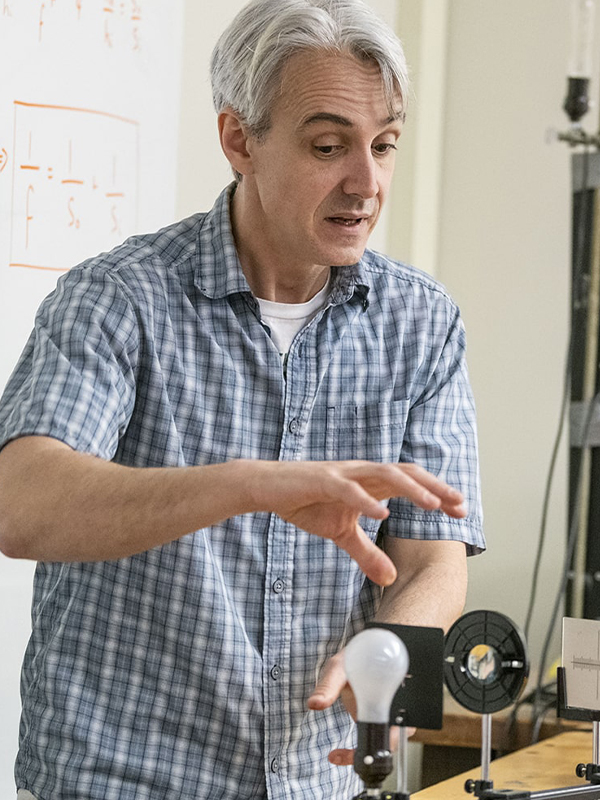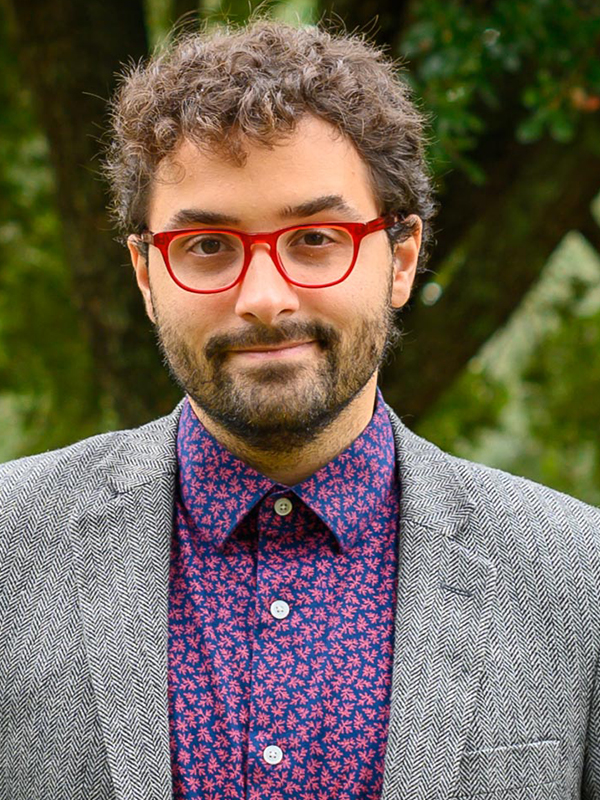

anderson wins university teaching award
Associate Teaching Professor of Physics David Anderson received Carnegie Mellon University’s 2022 William H. and Frances S. Ryan Award for Meritorious Teaching. He was honored at the annual Celebration of Education on April 28.
Anderson teaches introductory physics to non-physics majors, and he has made learning this intimidating subject both enjoyable and rewarding for students, according to their faculty course evaluations.
His nominators say he “pours his heart and soul into preparation for his classes” and has shown himself to be knowledgeable, engaging and respectful, confident in his delivery, occasionally and appropriately humorous, and always energetic, bringing historical perspective to his discussions of physics and providing useful applications to get his students to think more deeply about the material.
Colleague Barry Luokkala said he is one of the most outstanding teachers with whom he has had the pleasure to work in all his 35 years of experience at Carnegie Mellon. Fellow Ryan Award winner Helmut Vogel considers him “an enormously valuable asset to the Physics Department, to the college and to the university.”
When he is not teaching, Anderson works on a number of committees, including the CMU Academic Review Board and the Physics Department’s Undergraduate Curriculum Committee, which is focused on keeping Carnegie Mellon’s physics courses up to date and making sure students are as well prepared as possible for whatever is the next phase in their life, whether that’s graduate school, or industry, or applying their physics skills to data science, finance or some other field of their choosing.
He leads the annual teaching techniques workshops, a three-day series of training sessions for incoming physics graduate students at Carnegie Mellon. Faculty members often sit in on these sessions to try to capture some of Anderson’s magic — an example of how his teaching extends far beyond the hundreds of students he interacts with annually.
Anderson received his bachelor’s degree in theoretical physics from the University of Essex (UK). He then moved to York to study condensed matter physics under Professor Mohamed Babiker, focusing on the theory of electron-phonon interactions in low-dimensional materials. He received his Ph.D. in physics from the University of York. After working a temporary appointment at the York Structural Biology Laboratory examining the structure of proteins, he moved to the United States to teach at Deep Springs College in Inyo County, California. He lived briefly in Baltimore before moving to South Carolina to teach at Francis Marion University for three years. He has also taught in short-term positions at Duquesne University, the Pennsylvania Governor’s School and Sichuan University in China.
“Anderson is the quintessential teacher, dedicated to his students and his subject, hardworking and someone who loves his work,” his nominators wrote. “He has succeeded in bringing introductory physics to reticent students in a way that they truly appreciate and leverage for their future success.”
■ Kelly Saavedra

Physicist Carl Rodriguez Receives 2022 Packard Fellowship
The David and Lucile Packard Foundation has announced that Carl Rodriguez, an assistant professor in Carnegie Mellon University’s Department of Physics and member of the McWilliams Center for Cosmology, is one of 20 recipients of the 2022 Packard Fellowships for Science and Engineering.
The fellowships recognize innovative early-career researchers and include $875,000 to aid in each fellow’s research for five years.
“Each of the fellows in this year’s class is exceptional, and we’re excited to support them as they push the boundaries of discovery and innovation in their fields,” said Richard Alley, chair of the Packard Fellowships for Science and Engineering Advisory Panel and 1991 Packard Fellow. “We welcome them to the community of Packard Fellows and look forward to learning from them and helping them advance the frontiers of science and engineering for the good of all of us.”
Rodriguez’s work focuses on gravitational waves, ripples in spacetime that were first observed by the Laser Interferometer Gravitational-Wave Observatory (LIGO) in 2015. He is particularly interested in the dynamics and evolution of stars and star clusters, and what the gravitational waves they create can reveal about stars and galaxies across cosmic time.
“Stars are not fixed on the night sky, and their movements over billions of years create some of the most exciting astronomical events, from gravitational waves to gamma ray bursts to supernovas,” Rodriguez said. “The Packard Fellowship will provide our group with the freedom to develop the next generation of computational tools to explore this dynamical, high-energy frontier with unprecedented physical resolution. We’re truly indebted to Carnegie Mellon’s Physics Department for their support along the way.”
In his work, Rodriguez uses high-performance computing, including machines at the Pittsburgh Supercomputing Center, to simulate the dynamics of star clusters to better understand how gravitational forces affect the evolution of binary stars and create gravitational waves.
In addition to the Packard Fellowship, Rodriguez won a 2022 Sloan Research Fellowship and a Kaufman New Investigator Award in 2020. He joined the Carnegie Mellon physics faculty in the fall of 2020 after completing an ITC Postdoctoral Fellowship at Harvard and a Pappalardo Postdoctoral Fellowship at Massachusetts Institute of Technology (MIT). He earned his doctoral degree from Northwestern University and his bachelor’s degree from Reed College. Next year, he will join the faculty of the University of North Carolina.
The Packard Fellowships for Science and Engineering are designed to encourage innovative, blue-sky thinking by providing maximum flexibility and support to scientists and engineers early in their careers. This flexibility allows fellows to pursue trailblazing experimental research into critical issues like COVID-19 and climate change.
“The Packard Fellows embody the foundation’s commitment to science as vital to progress and cross-fertilization across academic disciplines,” said Walt Reid, the Packard Foundation’s vice president of environment and science. “The breakthroughs we see in the Packard Fellows community provide not just hope for the future, but also real paths forward for some of the most critical challenges we face in health care, climate change, technology and more.”
■ Heidi Opdyke
